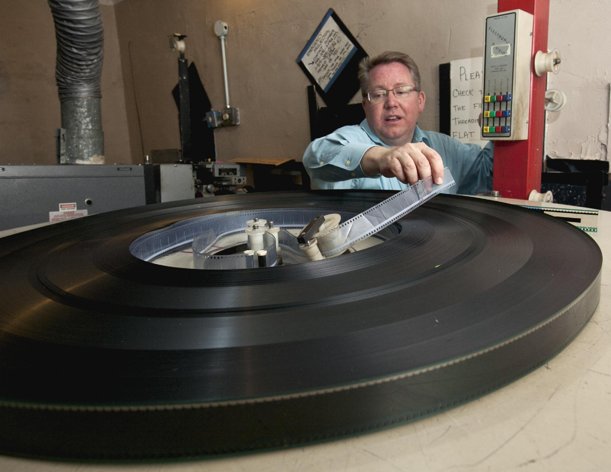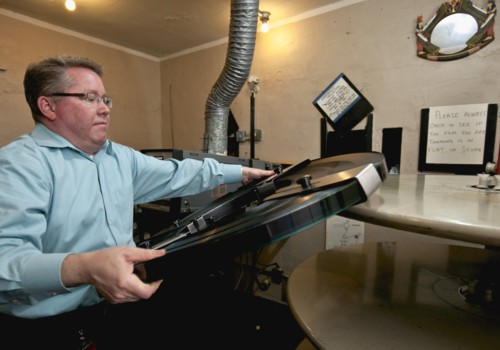|
|
This topic comprises 7 pages: 1 2 3 4 5 6 7
|
|
Author
|
Topic: Small theaters struggle as Hollywood goes digital
|
Monte L Fullmer
Film God

Posts: 8367
From: Nampa, Idaho, USA
Registered: Nov 2004
|
 posted 09-06-2012 02:51 AM
posted 09-06-2012 02:51 AM




The Results of "The Digital Realm" ... in story below:
News Link
quote:
CRETE, Neb. (AP) — The Isis Theatre hasn't changed much since it opened 86 years ago in southeast Nebraska, a stone's throw from the grain elevator and railroad tracks that cut through town.
But in the past few years, the movie industry has changed dramatically, and unless the Isis' owner comes up with $85,000 soon to pay for new digital equipment, residents of Crete, Neb., may have to drive 40 miles to Lincoln for a night at the movies.
It's a prospect that owner Thom Reeves doesn't want to ponder, but like thousands of small-theater operators across the country, he hasn't found a way out.
"This is my passion, to give back to the community," Reeves said. "I love this movie theater. I love what it does for the students I have employed there. We love our patrons. It's such a positive experience going on, and we're just a little sad this conversion is hitting us. How do we survive?"
For small-theater owners, the problem is the sudden switch from 35 mm film, an industry standard since about 1910, to digital — a format that's cheaper for both studios and distributors, and doesn't scratch as traditional film will. The switch means theater owners must buy new projection equipment, computers and a sound system.
Film studio 20th Century Fox has said it will phase out 35 mm film altogether by the end of 2013, and other production companies are expected to follow suit. Traditional film is expected to vanish over the next few years, despite the upcoming U.S. release of "The Master," which was shot with the rare but much higher definition 70 mm film.
Big chains can afford the digital transition, which can be cheaper when buying in bulk for multiscreen theaters. But those who own smaller theaters with one or two screens typically must take out a bank loan to pay for the equipment.
A film industry program can refund up to 80 percent of the cost to theater owners, but the payments are made gradually through fees based on the number of movies shown. To qualify for the help, theaters must have certain profit levels and show a minimum number of films, leaving many small operators without help.
Some small, independent theaters created a cooperative, the Cinema Buying Group, to pool their resources and participate in the industry program, but the cooperative also required a review of each theater's financial strength and other factors. Many of the smallest theaters didn't qualify or were hesitant to join.
Patrick Corcoran, a spokesman for the National Association of Theatre Owners, said costs of converting to digital average around $70,000 per screen. About 60 percent of the nation's 5,750 theaters have switched to all-digital equipment, he said.
The switch to digital began with the 1999 release of "Star Wars Episode I: The Phantom Menace," and accelerated with such computer animated films as Disney's "Chicken Little" and the 2009 Hollywood blockbuster, "Avatar," Corcoran said.
"In some markets, it's going to be a tough climb," he said. "But if you want to be in business as a first-run movie theater, you have to go digital."
Reeves, 46, who also is an insurance manager, said he only paid about $100,000 for the entire Isis Theater and never intended to make money from the operation. A good month brings about a $600 profit, he said, and most of that is spent on electrical fixes, carpet cleaning and other maintenance.
In Onarga, Ill., a city of 1,300 about 80 miles south of Chicago, Randy Lizzio is struggling to save his 75-year-old, single-screen Onarga Theater.
Lizzio launched a fundraising drive, including a dinner and auction with a local Mexican restaurant in a park, but after five months he has raised just $8,500 of the $65,000 he needs.
"The window is just about closed for us," Lizzio said. "... It's really tough for single-screen, little theaters, even though we're historic."
At the Ohio Theatre, a two-screen operation tucked into a row of picturesque downtown buildings in Madison, Ind., owner Tony Ratcliff also hasn't been able to raise the $81,000 needed for a digital conversion.
Ratcliff said he's trying to raise $25,000 for a down payment on a bank loan this fall, but he is behind his goal and now has little more than $9,000. Unless he can install digital equipment by next year, the theater may have to close. Ratcliff and other theater owners are looking at other uses for the theater, such live events, or renting it out for community gatherings.
Ratcliff said traditional, 35 mm film has become scarce, making it harder for his theater and others to get the films they need to stay in business. He pointed to one movie, "Courageous," which was released Sept. 30. Ratcliff said he could have received a digital version of the film in November but ended up waiting until late January to receive it in 35 mm because fewer copies were available. Movies often go to larger theaters first.
"It's only going to get worse, especially for small-town theaters," Ratcliff said. "We're the low man on the totem pole."
Allen Hinkle closed his Bonham Theater in Fairbury, Neb., on Aug. 2, after he couldn't sell the operation or attract enough donations.
It would cost $110,000 to install digital equipment in the 86-year-old theater, a brick structure featuring four large arched windows only a half block from the county courthouse.
As the final day neared, Hinkle said parents in the southern Nebraska town of 4,000 asked him what their kids would do now for entertainment. Hinkle said he didn't know how to respond.
On a warm, breezy night last week at the Isis Theater in Crete, few people showed up to see the 7:15 p.m. screening of "Total Recall."
Among the few were Gene and Robin Mignogna, a couple from Pennsauken, N.J., who were visiting relatives. Gene Mignogna said he was taking his wife on a date to celebrate his 57th birthday.
He smiled as he glanced up at the red and white theater marque.
"There's a kind of nostalgia, coming to places like this," he said.
(I used to run film soundtrack down on LP-270's also...)



| IP: Logged
|
|
|
|
|
|
|
|
|
|
|
|
|
|
|
|
Mike Blakesley
Film God

Posts: 12767
From: Forsyth, Montana
Registered: Jun 99
|
 posted 09-06-2012 01:38 PM
posted 09-06-2012 01:38 PM





As usual, there's a lot of misinformation in that article. Just once I would like to see one of the theatre owners say "I dragged my feet, thinking this whole digital thing would go away, but now we're in the soup because I kept procrastinating." That's the truth for a lot of operators. They are blaming the studios for this "sudden" conversion when it's been happening for a long time. It hasn't exactly been a secret...NATO has been blowing its horn on it for what, about 10 years now?
I think the biggest problem for a lot of small operators is, they haven't "kept up with the times" because they haven't made enough money. And, they haven't made enough money because they haven't kept up with the times.
In my high school years, at my parents' auto parts store, we had a stereo/TV department which I basically managed. This is where I became a "sound nut." When I got into the theatre business (1979) people were just starting to think about the upcoming "marriage" between the home stereo system and the TV set. So, when I started going to theatre conventions and hearing the speakers saying things like "You'd better give people something better than they can get at home, because HOME is what you're competing with, and it's only going to get tougher," I took that to heart. Rather than just keep polishing the same old thing and hoping for the best, we started upgrading the theatre. We're still doing that today, and our local citizens reward our efforts with good patronage.
One big secret, that MANY small operators miss, is to have their prices high enough to where they can make enough profit. I've never understood why small owners think their prices have to be super-cheap. They're showing the same movies, after all, and the popcorn is usually BETTER in a small place. There is one theatre (about 300 miles from us) that shows first run movies about a month off the break, but only charges FOUR DOLLARS for a ticket. No wonder they can't afford to convert to digital. Our prices are lower than a chain theatre, but I'd bet we're higher than the majority of the other small independents out there. And -- we get zero complaints about prices.
If you're in a big enough town, you can have super-low prices and get away with it, but most small operators don't have that luxury. In this day and age, anybody charging less than $7 for an adult ticket is just leaving money on the table...money they COULD be using for their digital conversion or other upgrades.
I guess the other big secret, for us at least, is "have a day job." There are a lot of operators who buy a small theatre and expect to live off of it, or at least be able to hire other people to run it. Usually, that won't work. My wife and I both have fulltime jobs -- the theatre pays its own bills, pays for its upgrades and provides us with some extra income, but if it wasn't for our day jobs, we'd be in the soup too.
So -- if you want to run a small theatre you have to be prepared to work hard, reinvest continuously, and charge what your efforts are worth. It's not rocket science.
| IP: Logged
|
|
|
|
|
|
|
|
|
|
|
|
|
|
|
|
All times are Central (GMT -6:00)
|
This topic comprises 7 pages: 1 2 3 4 5 6 7
|
Powered by Infopop Corporation
UBB.classicTM
6.3.1.2
The Film-Tech Forums are designed for various members related to the cinema industry to express their opinions, viewpoints and testimonials on various products, services and events based upon speculation, personal knowledge and factual information through use, therefore all views represented here allow no liability upon the publishers of this web site and the owners of said views assume no liability for any ill will resulting from these postings. The posts made here are for educational as well as entertainment purposes and as such anyone viewing this portion of the website must accept these views as statements of the author of that opinion
and agrees to release the authors from any and all liability.
|

 Home
Home
 Products
Products
 Store
Store
 Forum
Forum
 Warehouse
Warehouse
 Contact Us
Contact Us




 Printer-friendly view of this topic
Printer-friendly view of this topic











![[Roll Eyes]](rolleyes.gif)




![[Big Grin]](biggrin.gif) those of us more loyal to film could have kept on longer with film but noooo.
those of us more loyal to film could have kept on longer with film but noooo. ![[Smile]](smile.gif)




